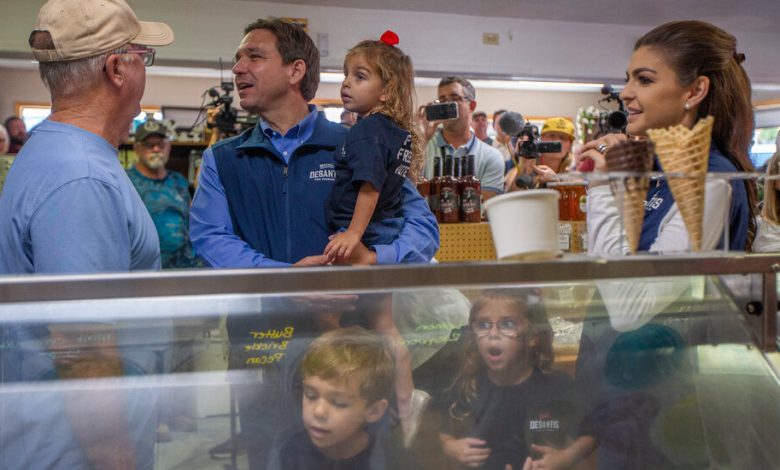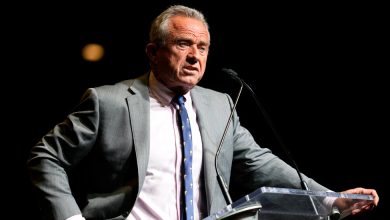On the Campaign Trail, an Impossible Task: Ignoring Trump’s Latest Charges

Days after the front-runner was indicted on charges of trying to subvert an election, Republican candidates in their presidential primary returned to the campaign trail acting as if nothing had changed.
Gov. Ron DeSantis of Florida scooped ice cream in Iowa as he pitched his economic plans. Senator Tim Scott met community leaders at the southern border with a promise to get tough on immigration. Chris Christie, the former New Jersey governor, showed up in Ukraine, a dramatic attempt to focus on foreign policy. And former Vice President Mike Pence talked up the “Trump-Pence administration” record at a town hall in New Hampshire.
But their dogged attempts to create a political safe space — an indictment-free zone, where they are not asked to defend or attack former President Donald J. Trump, the dominant leader in the race and the party’s most powerful figure — kept failing.
Reporters asked questions about stolen-election lies and presidential pardons. Voters wanted to know what they thought of the new charges. Trump supporters greeted Mr. Pence with a sign calling him a “traitor.” Mr. Trump, too, had thoughts.
“Every time they file an indictment, we go way up in the polls,” he said at a Republican Party dinner in Montgomery, Ala., on Friday night. “We need one more indictment to close out this election.”
The scenes demonstrated the nearly impossible challenge before the Republican field as the candidates soldier on in a primary like no other. As Mr. Trump rallies Republicans to his side against what he says is a political persecution, how can they move beyond a past election to talk about the future?
For months, their strategy has been simple: Ignore, deflect and change the subject. But it’s an approach that became significantly harder this week, as the felony counts against Mr. Trump grew to number 78 across three criminal cases with the addition of a federal indictment in a Washington, D.C., federal court accusing him of conspiring to defraud the government and to obstruct an official proceeding, as well as other crimes.
Addressing voters at a brewery in northeast Iowa on Friday morning, Mr. DeSantis focused on his usual themes: his record as Florida governor, his biography as a father and a military veteran, and his plans on immigration and economic policy. But he could not entirely escape the drumbeat of news from Washington.
When a member of the audience asked whether he thought Mr. Trump’s latest indictment was a “witch hunt,” Mr. DeSantis responded that the case was “politically motivated, absolutely,” and pledged to end the “weaponization” of federal government.
Later, a reporter asked whether he would pardon Mr. Trump, should the former president be convicted in the election case. Mr. DeSantis suggested he would — before quickly trying to recast the race as about the future.
“I don’t think it’s in the best interest of the country to have a former president that’s almost 80 years old go to prison,” the governor, 44, told reporters at a tire shop in Waverly, Iowa. “And just like Ford pardoned Nixon, sometimes you’ve got to put this stuff behind you, and we need to start focusing on things having to do with the country’s future.”
He added: “This election needs to be about Jan. 20, 2025, not Jan. 6, 2021.”
Still, there were some signs that the newest charges had pushed Mr. DeSantis, whose campaign is under pressure to appeal to more moderate voters, to inch toward criticism of Mr. Trump. After his event, he acknowledged that claims about the 2020 election’s having been stolen were “unsubstantiated” — a more direct response than he typically gives when asked about Mr. Trump’s defeat.
“All those theories that were put out did not prove to be true,” Mr. DeSantis said in response to a reporter’s question.
Part of the challenge for Mr. Trump’s opponents is that even Republicans who want to move past the former president defend him. Sandy Lloyd, a 61-year-old fourth-grade teacher, said she did not plan to vote for Mr. Trump, having grown tired of the frequent controversies surrounding him. Yet she said that she thought the election had been stolen and that she didn’t want to see Mr. DeSantis attack Mr. Trump.
“If I’m going for a new job, I don’t go into my interview and attack everybody else — I tell them why they want me,” Ms. Lloyd said. “That’s what I want to hear. Why do I want you as president?”
Others took a different view, arguing that the criminal charges against Mr. Trump would weaken him in a general election.
James Smith, a supporter of Mr. DeSantis who drove from Wisconsin to see the governor, said he wanted the Florida governor to be aggressive.
“I would love for him to go harder against Trump,” Mr. Smith said. “You’re not going to win the Republican nomination by not going after the leader. The only way to shake up the race is by attacking.”
But no candidate has a harder time escaping the political realities of the Trump indictments than Mr. Pence, who told prosecutors that Mr. Trump had pressured him to reject electoral votes in an attempt to disrupt the transfer of power.
About a dozen Trump supporters gathered outside the American Legion post where Mr. Pence spoke Friday evening. They heckled him as he entered.
“What Pence did is, he committed treason — that’s the bottom line,” said Derek Arnold, a protester from Derry, N.H. “He had the choice to do the right thing. And that man knows right from wrong, and we’re here to let him know that he did us wrong.”
When Mr. Pence told a standing crowd of around 100 people that he had “stood loyally by President Trump,” his comment prompted scoffing from some in the room. But he was applauded after he finished his thought: “And I never changed my commitment to him until the day came that my oath to the Constitution required me to do otherwise.”
Asked if he would pardon Mr. Trump, Mr. Pence was noncommittal.
“I really don’t understand why some candidates in the Republican primary are assuming that the president is going to be found guilty in these various cases,” Mr. Pence said. “Let him make his case in court, and if I have the privilege of being president of the United States, whatever pardon request comes before me, I’ll always give a thoughtful, prayerful consideration.”
Around a dozen people in the crowd said they were still making up their minds on whom to support. Some were looking for a Trump alternative, but not all considered the charges against him disqualifying.
“I feel bad that the country has to go through that, never mind Trump himself,” Fran York said of the prosecutions of Mr. Trump. “I’m not sure that what he did was so bad that he should be indicted.”
Mr. York, who is supporting Mr. Pence, said he would vote for Mr. Trump again if he won the nomination.
Mr. Scott, who has said little about the election indictment, went to Yuma, Ariz., to promote his plan to spend $10 billion on the border wall started by Mr. Trump. There, too, he repeated his accusation that the Justice Department was “hunting Republicans.”
“My perspective is that the D.O.J. continues to weaponize their power against political opponents,” he said, deflecting a question from an NBC reporter about whether Mr. Trump’s legal cases were dominating the campaign.
Perhaps the only candidate other than Mr. Trump who was eager to talk about the indictment was Mr. Christie, who has focused his campaign on undercutting the former president. Mr. Christie has struggled to break 3 percent in recent polling of the contest.
“It’s an aggressive indictment,” he said from a train headed to Kyiv, Ukraine, on Thursday night. “But what I believe is a much more important question than the criminality, in the context of this campaign season, is the fact that he’s morally responsible for Jan. 6.”
Charles Homans contributed from Kyiv, Ukraine; Maya King from Montgomery, Ala.; Anjali Huynh from Londonderry, N.H.; and Neil Vigdor from Columbia, S.C.




